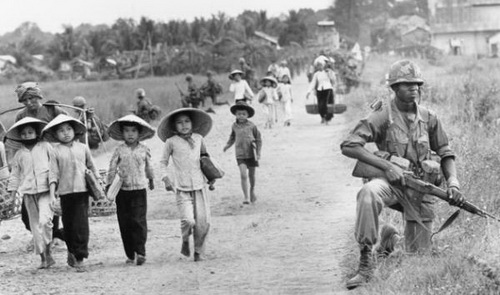Tuoi Tre interviewed Nick Turse, author of the NYT best-seller Kill anything that moves: The real American War in Vietnam, about his book.
Part 1: The stories of civilians neet to be preservedPart 2: Sacrifice individual stories to tell the larger truth
1. It's been three months since the publication of the book. What could you say about the response of the public so far? Could you share some noteworthy responses from ordinary readers of the book (the veterans, individuals quoted or mentioned in the book, Vietnamese people experiencing the war...)?
I’ve been absolutely shocked by the amount of notice the book has received and absolutely stunned by just how positive it has been since this a troubling topic for most Americans. I expected something of an angry backlash in US. Yet, the book became a best-seller and the response I’ve received had been 90% - 95% positive.
The responses from American veterans of the war have been some of the most humbling and heartening that I’ve received. Some have told me that the book corroborated what they had witnessed. For some, it offered long-delayed validation. For others, it simply offered a chance to open up about memories that they had held inside for so many years. So many of them expressed gratitude and thanked me for finally telling the truth.
Just the other day, a Marine who served in Vietnam during 1966 and 1967 emailed to thank me for writing Kill Anything That Moves. “I saw daily the horrors that you have documented… The only way to truly end the Vietnam War is to make amends,” he wrote. “Telling the full story of the war is an important step forward.” Letters like that means so much to me.
2. You stumbled upon the subject almost by accident. It was a subject of the distant past. What made you decide it was significant enough to pursue over such a long period of time? Many Americans as well as Vietnamese have chosen to move on and have tried to close that chapter...
I truly did stumble upon this project and it began as a history of US atrocities in Vietnam. But after I traveled to Vietnam for the first time and after speaking – via a translator – to survivors of the war in the countryside, I began to understand the conflict in a new way. The Vietnamese people I interviewed taught me so much about what it was like to live for years and years under bombs, artillery shells, and helicopter gunships. They told me about how they had to negotiate every aspect of their lives around the American war machine. Until I spoke to survivors, I just didn’t grasp the scale of the suffering and the scope of the hardship. I came to see this as the real story of the war, but one that was missing from American histories of the conflict.
In the US, we have 30,000 books in print on the Vietnam War, and most of them deal with the American experience. They focus on American soldiers and generals, on military strategy and tactics, on the politics of the war and related matters. But I didn't see many that really attempted to tell the story of what I came to see as the signature aspect of the conflict, which was Vietnamese civilian suffering.
Millions of Vietnamese were killed, wounded, or made refugees by deliberate US policies. But almost any discussion of Vietnamese civilian suffering is condensed down to a couple pages or paragraphs about the massacre at My Lai. I wanted to do my best to set the historical record straight.
3. Reading the book, I was struck by the part where you wrote about going from town to town in the South searching for the leads, and realizing similar incidents (of war crimes) happened everywhere you looked. To the Vietnamese audiences who were born around or after the end of the Vietnam war, this would likely be a poignant realization when they get to read your book. From your vantage point, what should they learn from the book, and from your own research on the ground?
I would never presume to give young Vietnamese advice on what they should take from the book, but I’d be very happy if it started new conversations about the war.
In many of the rural hamlets I visited, children would congregate and listen to the stories. I was told that, in many cases, they were hearing about what people in their hamlet went through during the war for the first time. I think it’s important for young people to know and understand what their elders endured. I can understand wanting to shield children from such horrors, but I think it’s important that future generations have an appreciation for what their parents and grandparents and great-grandparents went through.
I know many military histories of the war exist in Vietnam, but I believe the stories of civilians need to be preserved, too. Vietnam is changing rapidly and the American War is becoming a more distant memory, but I sincerely hope the stories of ordinary Vietnamese are preserved for future generations.
(to be continued)



















































